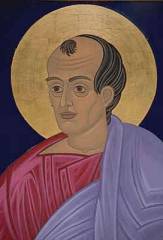

It was during the early rule of the Romans in Egypt that the world witnessed the birth of Christianity, and event sure to shape the rest of history. This new religion was initiated in Alexandria by St. Mark who was martyred in 62 CE for protesting against the worship of Serapis, a popular cult in Alexandria. Early Christian centers of Alexandria, including the oratory of St. Mark and the Catechetical School were the first of their kind in the world.
The Influence of Alexandrian Christianity
At its height, Alexandria was the second city in the world, with a population of 600,000. It's great library, the greatest ever built, housed anywhere from 400,000 to 700,000 volumes and at one time her assembled students numbered greater than 14,000. Alexandria was the center of the world's learning, culture, and thought; the scholars of truth and knowledge from all over the world sought inspiration in her shrines. Most of all, Alexandria was not only the radiating hub of Christian influence, but its teachers and schools provided for Christianity a basis of universal salvation.
"In such a city as Alexandria--with its museum, its libraries, its lectures, its schools of philosophy, its splendid synagogue, its avowed atheists, its deep-thinking Oriental mystics--the Gospel would have been powerless if it had been unable to produce teachers who were capable of meeting Pagan philosophers and Jewish Philoists on their own ground. Such thinkers would refuse their attention to men who could not understand their reasonings, sympathize with their perplexities, refute their fundamental arguments, and meet them in the spirit of Christian courtesy.4 Different instruments are needed for different ends. Where Clement of Rome might have been useless, Clement of Alexandria became deeply influential. Where a Tertullian would only have aroused contempt and indignation, an Origen won leading Pagans to the faith of Christ. From Alexandria came the refutation of Celsus; from Alexandria the defeat of Arius. It was the cradle of Christian theology.5 "There can be no doubt that the wonderful advance of Christianity among the cultivated, during the First and Second Centuries, was made by the remarkable men who founded and maintained the Alexandrian school of Christian thought. While the common people heard gladly the simple story of the Gospel, the world's scholars were attracted and won by the complete, achieved learning and genius of Clement and Origen, and their assistants." Frederic William Farrar. Lives of the Fathers, I, p. 262, 263.
Martyrdom in Alexandria
The Christian population of Alexandria inevitably grew and so did the persecution from the Roman Emperors, especially Decius, Severus, and Diocletian. During the "Era of the Martyrs" around 284 CE an estimated 144,000 martyrs were slaughtered over a nine year period. The Romans were as afraid of the Christians in Alexandria as they were of the Christians on their home soil. These executions did not stop the growth of the Catechetical School, however. Around 200 CE Clement of Alexandria and Origen were teaching at the school, which no doubt added to its rapid growth in size and influence. Constantine's announcement of Christianity as the official religion of the Empire in 312 only furthered the Christian cause in Alexandria.
Alexandrian Christianity's presence today
The Alexandrine "current of Christian thought was never entirely lost, but rose to the surface again and again at the most critical periods in the history of the Christian religion. Unchecked by the Council of Nicaea, 325 CE, that ancient stream of philosophical and religious thought flows on, and we can hear the distant echoes of Alexandria in the writings of St. Basil (329-379 CE), Gregory of Nyssa (332-395 CE), Gregory of Nazianzus (328-389 CE), as well as in the works of St. Augustine (364-430 CE)," according to Muller.
The Christians of Alexandria were no doubt influential in its beginning. A brief glance of the Christian theologians who taught in Alexandria at the time proves so much. In fact, some modern scholars have gone so far as to claim that the true proponents and transmitters of Christianity were not the disciples, but those who taught its theologies in Alexandria.
For a thorough treatment of the Theologians of Alexandria, see the Power point presentation.